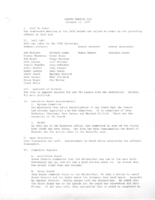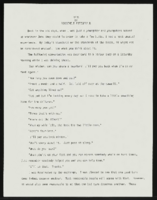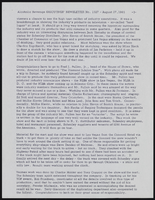Search the Special Collections and Archives Portal
Search Results
Dennis McBride LGBTQ Poster and Sign Collection
Identifier
Abstract
The Dennis McBride LGBTQ Poster and Sign Collection (1977-2018) contains posters and signs created by the Las Vegas, Nevada Lesbian, Gay, Bisexual, Transgender, and Queer/Questioning (LGBTQ) community, collected by historian Dennis McBride. These handmade and commercially printed signs cover events of particular interest to the Las Vegas, Nevada LGBTQ community, including social events, entertainment venues, political rallies, and Gay Pride events.
Archival Collection

Patricia Vazquez interview, November 14, 2018, June 14, 2019: transcript
Date
Archival Collection
Description
Session 1: Interviewed by Marcela Rodriguez-Campo. Barbara Tabach also participates in the questioning. Session 2: Interviewed by Rodrigo Vazquez. Monserrath Hernandez also participates in the questioning. Patricia Vazquez was born and raised in Las Vegas, NV and shares her experiences growing up in the Valley as a Queer Latina. At a young age, she remembers traveling back and forth between Mexico and the U.S. to visit family. When she started school she shares how her home language, Spanish, became her family's "secret language" as she began to learn English. During elementary school Patricia was tracked into the special education program, and remove from the mainstream classroom. She would find her love for learning in books and libraries as she taught herself how to read in English. Despite being tracked into less advanced courses, Patricia would end up taking AP/ Honors courses in high school after forging her favorite teachers signature, which changed her educational trajectory. After coming out to her family, Patricia went nearly a decade distanced from her mother and continued her college education at Arizona State University. There, she would complete a bachelors in painting and a masters in comparative literature. Her work with the Chicano Studies program at ASU helped her develop her Chicana identity and begin her involvement in social activism. In Las Vegas, she worked to fight for marriage equality and LGBTQ rights with the American Civil Liberties Union , and later with the Progressive Leadership Alliance of Nevada. She also conducted several lectures for the Latino Youth Leadership Conference on sexuality, gender, and homophobia for over a decade. She has served as an English Professor at the College of Southern Nevada for the last 20 years and is an avid hiker, traveler, and painter.
Text

Meeting minutes for Consolidated Student Senate, University of Nevada, Las Vegas, August 05, 2002
Date
Archival Collection
Description
Text

Meeting minutes for Consolidated Student Senate, University of Nevada, Las Vegas, October 11, 1977
Date
Archival Collection
Description
Text

"Reds": article draft by Roosevelt Fitzgerald
Date
Archival Collection
Description
From the Roosevelt Fitzgerald Professional Papers (MS-01082) -- Drafts for the Las Vegas Sentinel Voice file. On Americans welcoming Russians with VIP treatment, while minorities continue to be mistreated.
Text

Marvelys Lopez Omaña oral history interview: transcript
Date
Archival Collection
Description
Oral history interview with Marvelys Lopez Omaña conducted by Monserrath Hernandez and Barbara Tabach on February 21, 2020 for the Latinx Voices of Southern Nevada Oral History Project. In this interview, Marvelys Lopez discusses her childhood and growing up in Caracas, Venezuela, where her father owned a toy store. She attended an all-girls Catholic School and from a young age knew that she wanted to be a doctor. In 1993, at the age of seventeen, she was able to study abroad in the United States for one year and moved to Las Vegas, Nevada. She returned to Venezuela to attend medical school and while attending medical school she met her husband, who was studying to be a registered nurse at the time. Lopez Omaña recalls volunteering as a firefighter in Venezuela, and discusses the political change that happened in Venezuela during her last years in medical school. She moved to back Las Vegas with her husband in 2003 and began working as a caregiver. She recounts Her first son's birth story, and describes how she became a Certified Professional Midwife.
Text

Dr. Alvaro Vergara-Mery oral history interview: transcript
Date
Archival Collection
Description
Oral history interview with Dr. Alvaro Vergara-Mery conducted by Barbara Tabach on October 28, 2020 for the Latinx Voices of Southern Nevada Oral History Project. Alvaro discusses his personal history and his upbringing in both Chile and the United Kingdom before immigrating to the United States; due to political unrest in Chile, he moved to the U.K. where his mother was born before attending university in the United States. Alvaro talks about his work as a medical interpreter for University Medical Center (UMC) as well as his college teaching experience at University of Nevada Las Vegas and California State Berkley.
Text

Transcript of interview with Jan Kennedy by Barbara Tabach, September 7, 2011
Date
Archival Collection
Description
Jan Kennedy was born (1924) Janet Parmelee, the daughter of a Connecticut physician and a homemaker. In high school she met Norman Kennedy, who she would marry after both had attended college and to whom she was married for 64 years. Until 1963, their roots seemed to be taking hold in the Seattle area. That is until Norm was offered an attractive career opportunity as a weather man at the Nevada Test Site. They settled in and enjoyed a zest-filled life with their four sons and a dynamic group of friends who they often entertained at their cabin in Mount Charleston. In addition, Jan managed to volunteer for a list of organizations including UMC Hospital/Southern Nevada Memorial Hospital; Clark County Museum Guild; Salvation Army Women's Auxiliary; church deacon; Assistance League; Red Hats—keeping herself ever busy and joyfully satisfied.
Text


